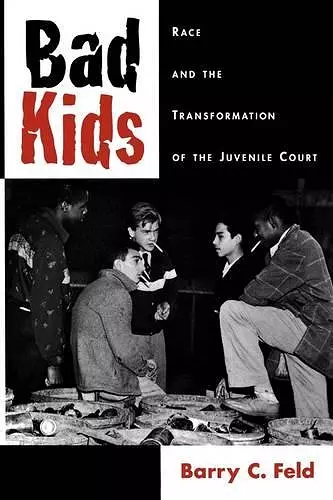Bad Kids
Race and the Transformation of the Juvenile Court
Format:Paperback
Publisher:Oxford University Press Inc
Published:18th Mar '99
Currently unavailable, and unfortunately no date known when it will be back
This paperback is available in another edition too:
- Hardback£89.00(9780195097870)

Winner of the Outstanding Book Award from The Academy of Criminal Justice Sciences!
This book explores the social and legal changes that have transformed the juvenile court since the 1970s from a nominally rehabilitative welfare agency into a scaled-down criminal court for young offenders.Within the past three decades, social and legal changes have transformed the juvenile court from a nominally rehabilitative welfare agency into a second-class criminal court for young offenders. Recent efforts to "toughen" juvenile justice policies have resulted in increasingly harsh sanctions that fall disproportionately on minority youths. In this provocative new book, Barry Feld examines what went wrong with the juvenile court and proposes an alternative model for youth crime control and child welfare. The Progressive reformers who created the juvenile court a century ago saw children as relatively blameless and innocent. But recent decades of rising crime rates associated with urban decay have strained this tolerant view of young offenders. Feld relates the 1967 Supreme Court decision In re Gault to the broader social and legal changes associated with the civil rights movement and the Warren Court's "Due Process Revolution." Although gault mandated more elaborate procedural safeguards in delinquency hearings, ironically, those protections legitimated the imposition of more punitive sanctions. Since Gault, Feld argues, three decades of judicial, legislative, and administrative reforms have conducted a form of "criminological triage." At the "soft end," reforms have shifted noncriminal status offenders, primarily female and white, out of the juvenile justice system into a "hidden system" made up of private sector mental health and chemical dependency facilities. At the "hard end," states transfer increasing numbers of young offenders, disproportionately minorities, to criminal court for prosecution as adults. Meanwhile, juvenile courts punish more severely those delinquents-again disproportionately minorities-who remain within the increasingly criminalized juvenile justice system. Feld attributes the current state of affairs to a conceptual flaw inherent in the juvenile court. The juvenile justice system attempts to combine social welfare and social control functions in one organization, but inevitably fulfills both missions badly because of the inherent and irreconcilable contradictions between them. Progressive reformers situated the juvenile court on a number of cultural, legal, and criminological fault lines, where the ideas of child and adult, determinism and free will, immature and responsible, treatment and punishment collide. The past three decades have witnessed a shift from the former...
"This book is written by a leading scholar and a committed advocate of social justice for children....This is a compelling and thoughtful book, controversial and radical to many....it is the best we have to get those of us stuck at the crossroads onto the right road into the next 100 years of the juvenile system in America."--Federal Probation
"...compelling...he does...correctly identify the conceptual flaw in a system."--Juvenile Justice Update
"An extraordinary contribution to the study of crime and criminal justice."--Outstanding Book Award Citation, The Academy of Criminal Justice Sciences
"[Barry Feld is] one of the most eloquent, prolific, and influential critics of the America juvenile courts. His work exemplifies thorough socio-legal scholarship through his examinations of juvenile justice policies, juvenile court practices, and the social meanings surrounding the punishment of juveniles... His ides are presented here with clarity and detail...the most coherent and thorough review and analysis of the literature on American juvenile justice- adding, or course, his trademark argument in favor of abolishing the juvenile court." Punishment and Society111
- Winner of Winner of the Outstanding Book Award from The Academy of Criminal Justice Sciences!.
ISBN: 9780195097887
Dimensions: 155mm x 234mm x 29mm
Weight: 540g
392 pages